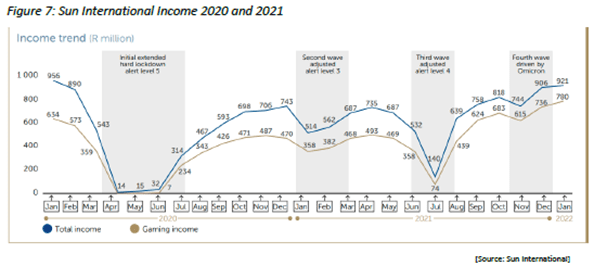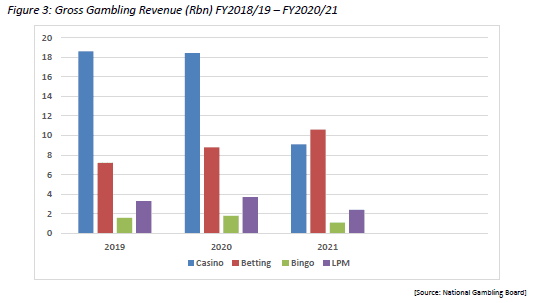When gambling is not a gamble
Going by the corporate actions listed in the WOW report on The Gambling Industry in South Africa – August 2022, one can infer that the gambling business is alive and well in South Africa. Like most industries in South Africa, the gambling industry went through difficult periods recently, and the lockdown in 2020 and the riots in 2021 added insult to injury. Gambling falls within the same category as alcohol and cigarettes – activities considered by government as targets for so-called sin taxes, deemed to be easy money-making businesses. This might have been so in the past, but with the advancements in technologies and digitisation, the picture has changed, with some limitations discussed below. But first, we should look at behaviours associated with gambling.
Gambling habits
Daniel Kahneman a psychologist and economist who won an economics Nobel Prize, developed a theory that says that people generally have a risk aversion to loss when winning. One sees this in gaming shows, where most people take the cash rather than go for one final chance to triple their winnings or lose all. On the other side of the coin, people become risk-takers when invested, or display an unwillingness to cut losses, and bet further in the hope of recovering what they initially lost, even if the probable outcome of the bets is against them.
Of course this does not completely explain why people gamble, but it gives an insight into why such behaviour can lead to disastrous gambling addiction.
Before the advent of democracy in South Africa, casinos and horse racing were categorised differently. Horse race betting was not considered pure probabilistic gambling and therefore legal, as it was based on the knowledge and characteristics of a horse and it was assumed it was possible to calculate its chances of winning over another horse, and was thus not considered gambling. But the landscape has drastically changed.
Regulatory limitations to gambling
The WOW report touches on some of the limitations of the taxes that apply to gambling businesses.
The 2020 brutal lockdowns with extended restrictions hurt the on-site business (casinos, gambling venues, etc). Sun International’s income during the period, illustrated in the diagram below, points this out.

In fact, several casinos closed doors and did not re-open, others were bought out by larger groups and some scaled down considerably by closing some of their facilities and laying people off.
The industry contributes immensely to tax revenues, and the severe drops in income and permanent closures significantly impacted the fiscus.
Other potential permanent tax losses will, ironically, be caused by the overtaxing of horse betting businesses, should the proposed increase be implemented. Horse betting relies on the breeding, training and caring of horses as well as the arrangement of races. Over and above the different taxes imposed on the gambling industry, there is a proposal to increase transformation taxes in KwaZulu-Natal. This increase can have a devastating effect on Gold Circle (the licensed operator in the province), which is currently forecasting a loss of R106m for the 2022 financial year after paying a R66m betting tax contribution. A similar proposal was passed in Gauteng and led to Phumelela going into business rescue a year after its implementation as per the WOW report.The third challenge, which is probably the most impactful one, is that of preserving the government’s income base from gambling operations.

The COVID-19 lockdowns accelerated the shift in gambling methods, from physically visiting gambling casinos and betting facilities to technology-driven, online gambling including on mobile phones.
These new trends have possibly led to the decline in the casino industry, which is a much more lucrative segment for government and impactful for the economy and social development. According to the WOW report, between 2010 and 2022, the casino share of total gambling revenue declined from 84.4% to 39.2%.
It is currently very difficult for the government to collect revenue from online international operators. Another challenge is for the government to handle illegal gambling activities, estimated to be undertaken by 27% of gamblers.
Gambling and government actions
The shift to online gambling, which has become a worldwide phenomenon, has made it easy for international companies to raid the South African gambling market and as a result, has placed a large potential income source beyond the ambit of tax collection for the government.
Small South African businesses are hindered by the high cost of regulatory compliance, as well as exorbitant taxes and gambling levies. The need to prove access to finance and provide detailed long-term business plans are cumbersome, and the long drawn-out process to obtain new licences for limited pay-out machines, bingo, and sports betting unequivocally further impedes the principles of transformation and the development of small businesses.
With the South African economy struggling to grow, it could be of benefit to the government to create an enabling environment for this industry, which has the potential to increase revenues, drive transformation, and offer incentives for much needed investments.
Contact us to access WOW's quality research on African industries and business
Contact UsRelated Articles
BlogCountries Human health and social work activitiesSouth Africa
The cleaning products industry – trends and sustainability
Contents [hide] Making soap is a simple process of adding caustic soda to water and mixing it with oil, yet the industry has become one of the most essential and...
BlogCountries Human health and social work activitiesSouth Africa
Is the South African healthcare sector in crisis?
Contents [hide] Introduction Information on the healthcare sector is plentiful and summarised in the latest WOW report on the healthcare sector in South Africa. Besides the issue of the relatively...
BlogCountries Human health and social work activitiesSouth Africa
Exploring Pharmaceutical Companies in South Africa
Contents [hide] The pharmaceutical industry in South Africa, like in many other countries, is made up of a mix of local and international owners. Over the years, multinational pharmaceutical companies...





